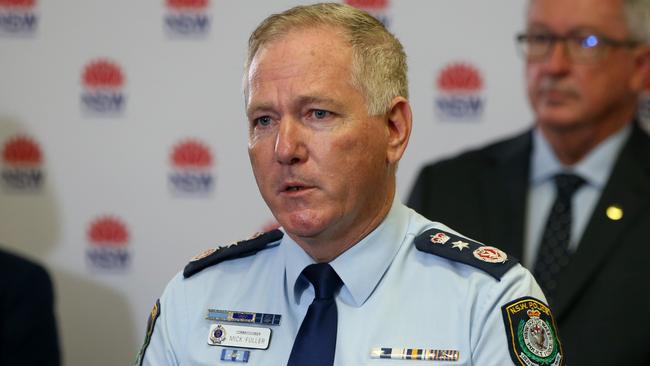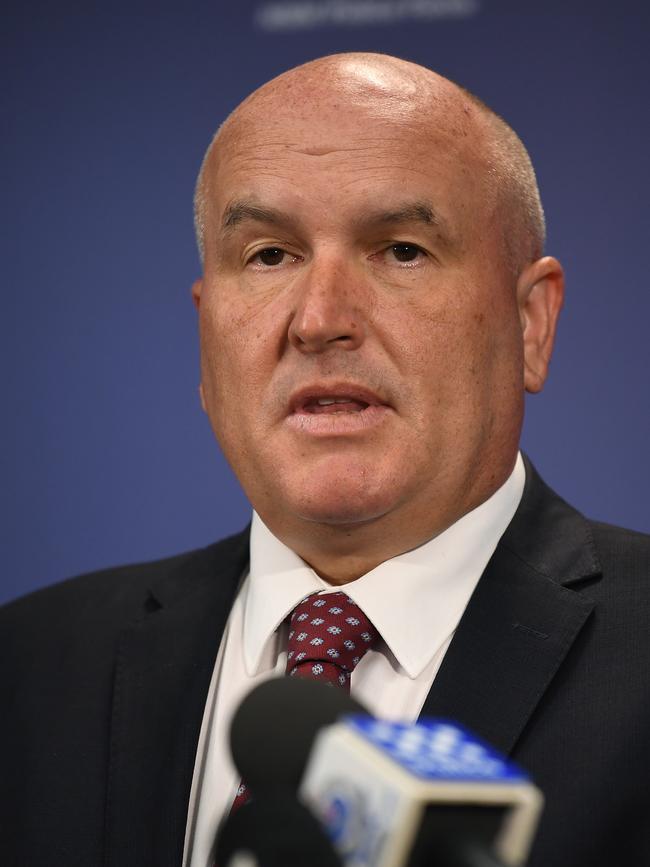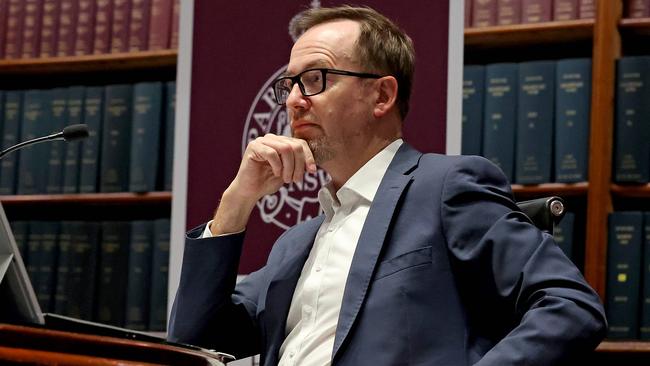Police Commissioner Mick Fuller calls for rape law reforms
NSW Police Commissioner Mick Fuller is pushing for changes to sexual assault law reform, saying the issue of consent is a struggle for courts.

NSW
Don't miss out on the headlines from NSW. Followed categories will be added to My News.
Pressure is mounting on the state government to move on sexual assault law reform, with NSW Police Commissioner Mick Fuller adding his voice to deafening calls for change.
It comes in the face of sexual assault reports rising at an “extraordinary” rate — even though many victims don’t see justice, with conviction rates of less than 10 per cent.

Many cases come down to one legal definition — consent — and if the defendant believed the victim was a willing participant.
Mr Fuller said the issue of consent had been a real struggle for juries, judges and magistrates but it was not a new one.
“It is a real issue that’s playing out today and this is before you even go to a historic matter, where there’s no forensic evidence and it is very much a 30-year-old statement being taken,” he told a budget estimates hearing on Friday.
“I think there needs to be a line drawn in the sand about what consent is, and I think there needs to be a better criminal definition around that.”
The NSW government is currently considering how far it will go in redefining consent after receiving the findings of a Law Reform Commission review late last year.

Under NSW law, consent is defined as a free and voluntary agreement, and there is a list of situations in which a person cannot consent. But critics say it doesn’t go far enough.
As it stands, a person can be found not guilty of rape in NSW if they had an honest and genuine belief the victim was consenting, even if they weren’t.
“Because we can’t always change the law, we can’t change how people think but how can we do better,” Mr Fuller said.
“We are reviewing the entire gamut of our role in this part of the justice system to see if there is something we can do. If you look at domestic and family violence back in 2010 we turned that on its head and became pro-prosecution.
“Now that caused enormous grief and we lost a lot of matters in court. But we drove change by being pro-prosecution.”
Mr Fuller said sexual assault reporting, involving child and adult victims, had been increasing “extraordinarily high” over the past five years.
Police Minister David Elliott appeared to be in step with Mr Fuller when he was asked about a Sydney school petition about consent education.
“As the father of two young teenage boys it is a matter of serious and daily discussion in our house,” Minister Elliott said.
“The first call from me as the police minister, but firstly as a father, is that parents need to teach their children respect for women … having had a loved one severely beaten by a partner it’s something that seriously sets me off. Parents, do your job.”
While Mr Elliott admitted he was not aware of the petition started by Sydney schoolgirl Chanel Contos, nor had he read the stories in the petition, he still welcomed the debate on consent education.
“When I read some of these briefing notes coming through police channels that have been assaulted, it’s quite clear society has failed, and I’m delighted there’s a debate on consent,” he said.
‘HYPOCRITE’: POLICE MINISTER WEIGHS IN ON FIERY STOUSH
Police Commissioner Mick Fuller has had a fiery stoush with Greens MP David Shoebridge over the investigation into Christian Porter’s alleged historical rape claims.
Appearing at a budget estimates hearing on Friday morning, the Commissioner and Shoebridge were warned about “sniping” at each other during the questioning, with the Greens MP grilling Fuller on the Strike Force Wyndarra investigation.
Shoebridge repeatedly asked if NSW Police was right to close the case, given the woman committed suicide soon after withdrawing her case.
When Shoebridge asked if NSW Police applied to cross the border into South Australia to interview the woman, the Commissioner replied: “We are in a worldwide pandemic Mr Shoebridge, you might have missed that”.
The men also had a long back-end-forth over if the police statement on the matter should be called a “statement” or a “media release”.

Commissioner Fuller stressed that police never try and talk victims out of reporting assaults, but said it isn’t uncommon for people to withdraw their statements.
As the exchange became more heated, Commissioner Fuller said he wasn’t taking anything Mr Shoebridge said as fact.
“Commissioner I can assure you it’s mutual,” Shoebridge said.
POLICE MINISTER BLASTS “HYPOCRITE” SHOEBRIDGE
Police Minister David Elliott chimed in with some jabs at Shoebridge as the fiery exchange turned personal.
When asking the minister and Commissioner Mick Fuller about whether police officers should be allowed to have shares in gambling institutions, Mr Elliott called Mr Shoebridge a “hypocrite”.
“Drugs are worse [than gambling], and you advocate for them,” Mr Elliott said.
“You sit there as an advocate for illegal drugs and want to have a crack at someone for having a punt, you are so out of touch with reality mate,” he said.
Shoebridge fired back: “And you know what, I find it surprising that you’re police minister”.
FULLER CRITICISES ‘TRAGIC’ SYSTEM FOR VICTIMS
The police commissioner said he wanted reform in sexual assault laws so investigators could “do more”.
“I hope that justice systems across Australia change to allow us to do more in this space, but the answer is, at the moment, the way the laws are constructed is that no it doesn’t unfortunately, as tragic as that is,” he said.
“We have matters before the court at the moment where you have a credible victim, you have forensic evidence and an issue of consent is raised,” he said.
“Juries are finding it difficult to make a decision, we are having hung juries and that in a sense is the simplest issue, you have a current matter, current victim, you have recent evidence ... but this issue of consent is one that has struggles for juries judges and magistrates, its a real issue that’s playing out today.”
One of the Commissioner’s criticisms of the process is the ability of the offender to cross examine victims.
“And this is before you even go to a historic matter where there’s no forensic evidence, and it is very much a 30 year old statement being taken, and then the journey for victims who get cross examined potentially by the offender, its a horrendous journey,” he said.



